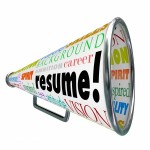
Widgetized Section
Go to Admin » Appearance » Widgets » and move Gabfire Widget: Social into that MastheadOverlay zone
Making A Career Transition? You’ll Need These Resume Tips
How and why you need to redo your resume when you’re changing careers
 So you’ve decided it’s time to start looking for another career? Then you are going to need a career transition resume with impact. You might be thinking, “Why not use my old resume and just punch it up a bit?” It’s better to start from scratch, says Karen Siwak, owner of Resume Confidential. She says that you will be telling a new story about yourself and other than the mandatory names of companies, titles, and dates, “the value proposition that you want to showcase will be different, the buying motivators of the hiring manager will be different.”
So you’ve decided it’s time to start looking for another career? Then you are going to need a career transition resume with impact. You might be thinking, “Why not use my old resume and just punch it up a bit?” It’s better to start from scratch, says Karen Siwak, owner of Resume Confidential. She says that you will be telling a new story about yourself and other than the mandatory names of companies, titles, and dates, “the value proposition that you want to showcase will be different, the buying motivators of the hiring manager will be different.”
The New Resume
If you haven’t yet heard, get ready to toss out your old ideas about resumes because we are in a new era. Gone are the days when you could feel pretty sure that someone was actually going to look at your cover letter and resume. Dawn Rasmussen, Chief Résumé Designer of Pathfinder Writing and Career Services, says when you are writing your resume, using key words “is especially important since many companies now use Applicant Tracking Systems (ATS) to scan résumés as a preliminary way to screen out non-qualified candidates.” She says this doesn’t mean you are gaming the system, but “you are simply giving it what it wants as it relates to your relevant skills.”
Many of the basic elements of a resume remain the same. Include contact information, relevant experience, accomplishments, and education, but Rasmussen notes that the Value Proposition, once called the Summary, “has grown up and now and conveys why an employer would want to hire you.” She suggests you use this section to incorporate your personal brand. And Siwak advises that you list your work experience “with an emphasis on career progression and accomplishments rather than tasks.”
Rachel Walden, Career Development Specialist, Office of Career Services at Belmont University, says that the most important aspect of a resume is that it is tailored to the position you’re applying for and that it catches the employer’s eye. She also adds that many recruiters are using social media as a part of their strategy, so include your LinkedIn address, Blog address, or other relevant sites.
Target Your Audience
Read the job description closely and carefully, says Walden. This will be the foundation for your targeted resume. She notes that the first few responsibilities in a job description are typically the most important, so jot down those key words, and use them.
Next put some thought into defining your transferable skills and experiences, and include those in your new resume. Rasmussen suggests that you “Put the shoe on the other foot: If you were the employer hiring for this position, what would you want to see in someone who is applying?” Review your work history and give specifics of what that job experience will bring to the new employer. Rasmussen continues, “Prospective employers pay the most attention to candidates that quantify their results – that show how they helped the business make money, save money, or save time.”
To DIY, or Not to DIY
Will you write your resume yourself, or are you considering hiring a professional to do the job? Walden recommends that your resume should be in your own words because no one knows your skills and experiences like you do. She does say, though, that if you don’t feel up to the task, you could contact a professional. They can point out problems with organization of material, priorities, language, and they can tell you things about the latest trends in writing a resume—what employers are currently looking for in resumes.
If you do write your own resume, it’s a good idea, says Walden, to have one or more people review it for you—friends or family, perhaps. They could provide valuable feedback and catch errors that you may have missed.
For those who don’t feel up to the task, Donna Svei, Executive Search Consultant & Executive Resume Writer, explains, “Most people are in over their head.” Resume writing is basically marketing yourself, and not everyone is good at marketing—especially themselves. Svei continues saying, “Resume writing is an extremely difficult skill to transfer to others. Anyone who has ever read resumes can vouch for that.” She notes that this is evident in the quantity of books written on the subject and the quality of the average resume.
In case you’re on the fence about your resume writing skills, Siwak says you might be in need of a professional if:
- You don’t have a clear understanding of how to describe your value proposition.
- You don’t have a clear understanding of the typical buying motivators of the hiring managers you want to target.
- You aren’t sure what information to put in and what you can keep out (or, you think everything is essential and have a ten page document)
- You are good at capturing the tasks that you’ve done, but not in explaining why the work you did mattered, who benefited, and how.
- You are struggling to define your accomplishments because there are no numeric metrics for what you did.
You can find professional resume writers through industry associations like Career Directors International or Career Professionals of Canada, says Siwak. Read their websites and ask questions when you contact them—like what process do they use? “This is an investment in your career, so it’s not the time to bargain hunt,” says Siwak.
Walden warns against scammers who charge $100-$500 for a formulaic resume. She has seen resumes returned with spelling and grammatical errors, and because they often use templates, this type of resume can be a challenge to edit since it usually contains tables. So ask if they use templates.
Now more than ever, it is mandatory to target the job requirements, and one resume will not serve for all job applications. Each time you apply for a position, you must update your resume to the specifics of the particular job. Remember to use key words. Don’t forget that you have much to offer the company, so let the employer know through a well-crafted resume.







You must be logged in to post a comment Login